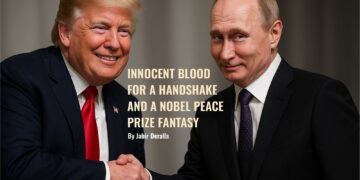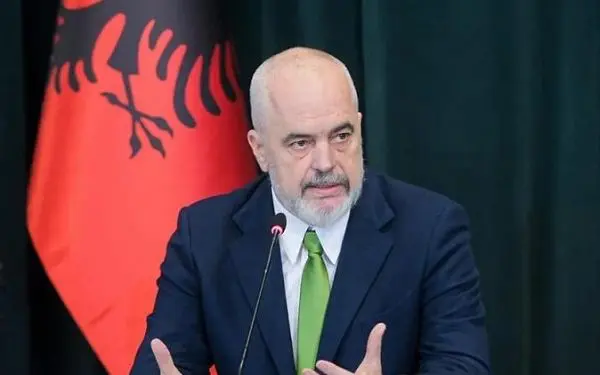Albanian Prime Minister Edi Rama said he doesn’t expect an EU summit next week to clear the way for his country to begin membership talks and placed the blame on Bulgaria.
All EU governments agreed back in March 2020 to give Albania and North Macedonia the green light to start membership talks. But negotiations have yet to get underway after Bulgaria insisted it wanted concessions from North Macedonia in bilateral disputes touching on language, history and identity.
Although Sofia’s blockade applies only to North Macedonia, the EU has favored handling the membership bids of Albania and North Macedonia together — so Albania is effectively blocked too.
The Western Balkan nations’ predicament is a timely warning about the vagaries of EU accession for Ukraine, which is pushing in the midst of Russia’s war to become an EU membership candidate at next week’s summit. The EU gave that status to North Macedonia in 2005 and Albania in 2014 yet has failed to even begin talks with either country.
German Chancellor Olaf Scholz visited Bulgaria last week in an effort to overcome Sofia’s blockade ahead of the forthcoming summit in Brussels, which takes place on Thursday and Friday of next week. But, in an interview with POLITICO, Rama made clear he was pessimistic.
“I don’t have any expectation. I think nothing will happen. Albania and North Macedonia will not formally open talks to have accession,” he said, sitting in a brown leather armchair in his office in Tirana.
Asked whether any EU leaders had signaled talks might begin soon, Rama replied: “What signals can they give? It’s not about them. Again, it’s about Bulgaria. They all agree, they all support, they all think that this should happen, and this should have already happened. But their margin of maneuver is limited from Bulgaria.”
Rama, 57, a former basketball player and a painter — who has covered the walls of his office with his own colorful artwork — said he did not expect Bulgarian leaders to change their position, as they had made the dispute into such a big issue that it was very hard to back down.
“It’s a spiral. They have entered a spiral. And from that spiral, it’s very, very difficult to get out,” declared Rama, who will attend a meeting of Western Balkan and EU leaders in Brussels ahead of the summit.
Bulgarian officials have defended their position, insisting they are simply asking North Macedonia to abide by previous commitments and seeking to protect the rights of Bulgarians in the country.
North Macedonia, for its part, has declared it is making good-faith efforts to engage with Sofia and stressed that a bilateral dispute should not hold up the start of talks between the EU and a would-be member.
Rama confirmed that if there is no progress this month, he will ask for Albania’s membership bid to be treated separately from North Macedonia’s — a step the EU has so far been reluctant to take, with officials arguing it would be better for regional stability if the two neighbors could advance together.
“If nothing will happen in June, we’ll ask to be separated from this couple that is lost in translation,” Rama said. “I’m confident that this is what we should do, then if [EU leaders] will agree or not, we’ll see.”
Backing for Macron
The Albanian leader also said he supports French President Emmanuel Macron’s idea of a European Political Community — an organization that would be open to both members and non-members of the EU.
“I think he’s right. This should have been done long ago … because this is visionary,” Rama said, while declining to get into details about the form the community should take.
“This can be discussed, but in principle, to have one political community which organizes itself in different ways … is very important, and it’s beyond the European Union that we have today … which is clearly not able to confront the challenges of the times that are lying ahead,” he said.
Macron framed his plan partly as a response to the war in Ukraine, suggesting the proposed community would be a quicker way for Kyiv to integrate into European political structures than the lengthy EU accession process.
Russia’s war has also highlighted divisions in the Western Balkans. Some countries — such as Albania — have followed the EU in imposing sanctions on Russia while others — such as Serbia — have not.
Although Serbia and Albania have frequently been at odds over the decades, Rama pleaded for understanding for Belgrade’s position.
“You have to understand that Serbia is in a very different position than many others, because of its history, because of its special ties with Russia,” he said.
He said he believed Serbia should impose sanctions over time but warned against pushing Belgrade, which is heavily dependent on Moscow for energy supplies, to do too much too soon.
“Asking them to go there, right now, and all over the range, is practically impossible … It’s suicidal for their economy,” he said.
Putting too much Western pressure on Serbia could be detrimental to the stability of the Western Balkan region, Rama warned.
“We need to sometimes bear with others and understand what’s going on, otherwise we cannot keep this community together for higher and better purposes,” he said.
“I think Serbia is on the right track. Of course, not with the speed we might like, we might want. But believe me, the other scenarios are really very bad for everyone and especially for this region,” Rama said.
Andrew Gray contributed to this article.
Source: Politico
















